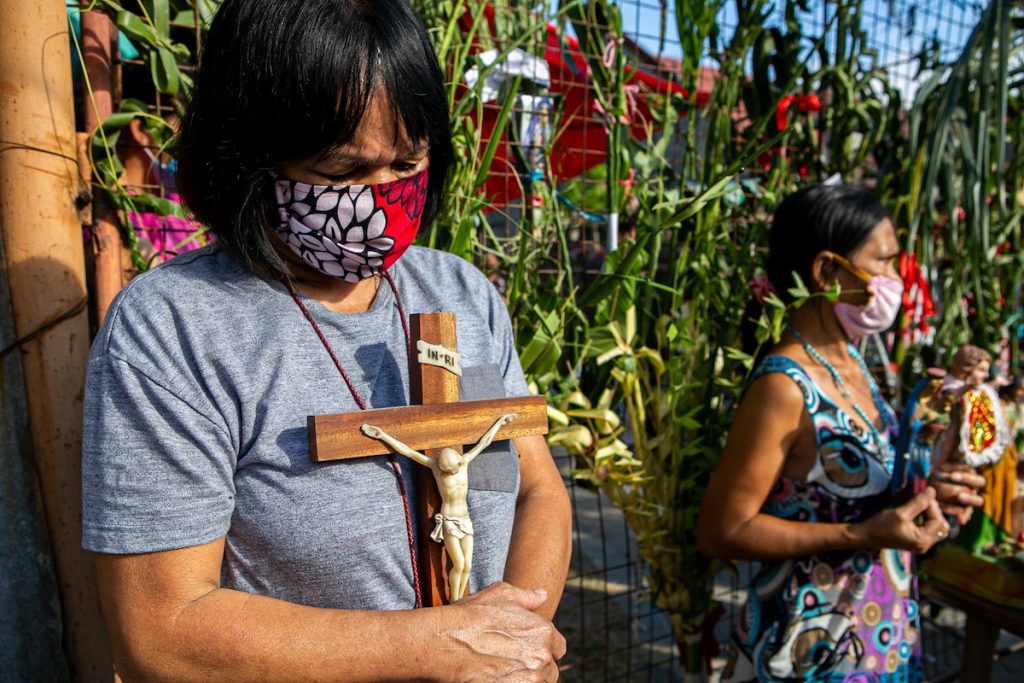
I think it is common sense to say you don’t just open your door at each time somebody knocks at it. Especially when the one who knocks is unexpected or a total stranger.
We’re lucky that nowadays, because of the blessing of digital technology, we have a way of announcing a visit in advance. We also have a way of knowing if we will be welcomed or not. Imagine what it must have been like in the time of Amos in our first reading, or in the time of Jesus in our Gospel reading, or in the time of Magellan, 500 years ago? Would you open your door to a stranger?
Our native ancestors opened their doors to strangers. Some of them turned out to be mercenaries and some of them were missionaries. There were those who brought harm and those who brought blessings. We look back 500 years later and ask, do we regret it that our ancestors opened their doors to them? Would we, 500 years later still open our doors to strangers after what we have been through with Spaniards, Americans, and the Japanese?
I think the answer is, it depends what the purpose of the stranger is. And there lies precisely the problem. To know the stranger’s purpose, you have to open your door or at least ask from inside when someone knocks, “Who’s there?”
In Tagalog, the stranger who knocks is expected to say TAO PO, which literally means “A human being is here!” Meaning, you assure the homeowner that you are a human person, that you come with a good purpose, not to cheat, to steal, or to commit a crime.
It is a normal thing to be cautious with strangers. If you don’t know them and you don’t know their purpose, why would you let them in? We even warn children not to talk to strangers, don’t we? And yet we also know that not all strangers come to bring harm. There are also those who come to bring a blessing.
Remember the strangers who passed by Mamre and whom Abraham and Sarah welcomed into their tent according to the Book of Genesis? They turned out to be God’s messengers. Too bad if they had not opened their doors. Abraham would not have received the blessing of becoming a “Father of many nations.”
Or remember the people of Bethlehem who refused to open their doors to Mary and Joseph in their hour of need? Too bad for them, they missed the opportunity of hosting the Messiah, or welcoming the Son of God into their homes. It was the poor and lowly shepherds who ended up receiving that grace.

Of course, we need to be cautious about the people we open our doors to. But we also have a problem if we become too xenophobic, paranoid and unwelcoming. In our first reading, we are told that the prophet Amos who is from the south was sent by God to prophesy to the people of the north, where he is a total stranger. And the priest of Bethel, Amaziah, tells him he is not welcome. He says, “Go home! Why don’t you preach to your own people? How dare you make a living outside your own territory?”
But Amos says, “I beg your pardon! I did not come here to get anything from you. I came here because I was sent to bring something to you — the Word of God. I come in the name of God.”
In the province where I come from, we do not say TAO PO when we knock at the door. Rather, we say, DISPU, a contraction of DIOS PO. It does not say A HUMAN BEING HERE! Rather, it says, GOD HERE! I come in the name of God, I beg you to open your door to the God who sends me to you. This is what it means to be a prophet, an apostle, or a missionary.
GOD HERE! And so our prophet and apostle par excellence also came as a human being like us: Jesus of Nazareth. He came into this world as a stranger and in this stranger we were supposed to encounter the IMMANUEL, the GOD WITH US. And so when he came to Jerusalem, there were people who waved palm branches and welcomed him saying “Hosanna, blessed is he who comes in the name of the Lord.” Actually, not everyone welcomed him with Hosanna. There were also those who cried out, “Crucify him!”
Today’s Gospel is about the good strangers whom God will often send into our lives to bring grace, peace, healing and reconciliation. Often, it is not until after we’ve taken the risk and dared to open our doors to them that we realize that they were God-sent. I imagine how often we may have deprived ourselves of the grace that God brings through these strangers because we have become too paranoid about our safety, too fearful, cautious and suspicious of people’s motives.
There are indeed people who come to bring us harm. They may come like malevolent intruders bringing evil with them and we have to know how to protect or defend ourselves, our families, our communities from them. That is why the Lord taught us to be discerning. He instructed us to be innocent as doves but clever as serpents.
But then again, there are also those who come as God’s messengers. We have to be quick at recognizing those who truly come in the name of God. It is what discernment ultimately is about. There are those who will come into our lives bringing with them not evil spirits but the Holy Spirit. They come as devil busters, who bring peace, healing, and reconciliation.
Above all, sometimes, we will be called to be those strangers. The stranger who visited us in Christ will continue to visit other people’s lives through us. St. Paul in the second reading says, “He has blessed us, chosen us, destined us for adoption, lavished us with wisdom and made known his will.” But the Gospel tells us what for. He sends us to be ourselves the strangers who will come in the name of the Lord.
In a Mass which Pope Francis celebrated with Filipinos in Rome, the Pope identified overseas Filipino Workers as among those welcome strangers. They have become our modern missionaries, the ones he jokingly called smugglers of the faith. Dear OFWs who might be reading this homily — may you continue to be those welcome strangers, may the Lord continue to visit the rest of the world through you!
Homily of Bishop Pablo Virgilio David of Kalookan for the 15th Sun in Ordinary Time, 11 July 2021, Mk 6:7-13
Source: Licas Philippines
0 Comments